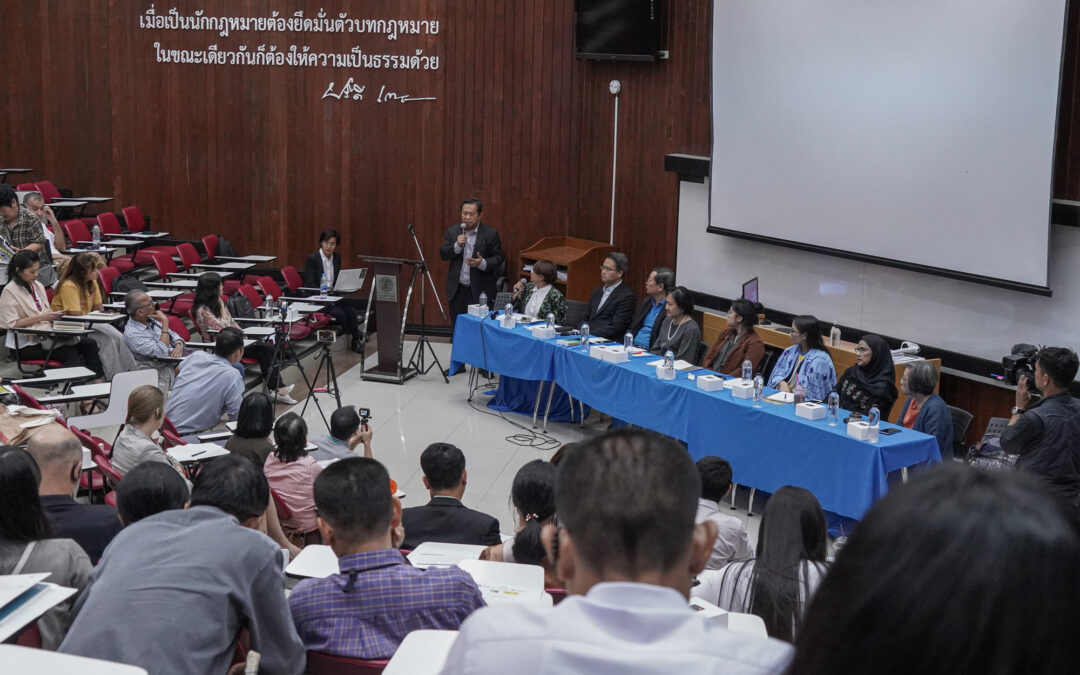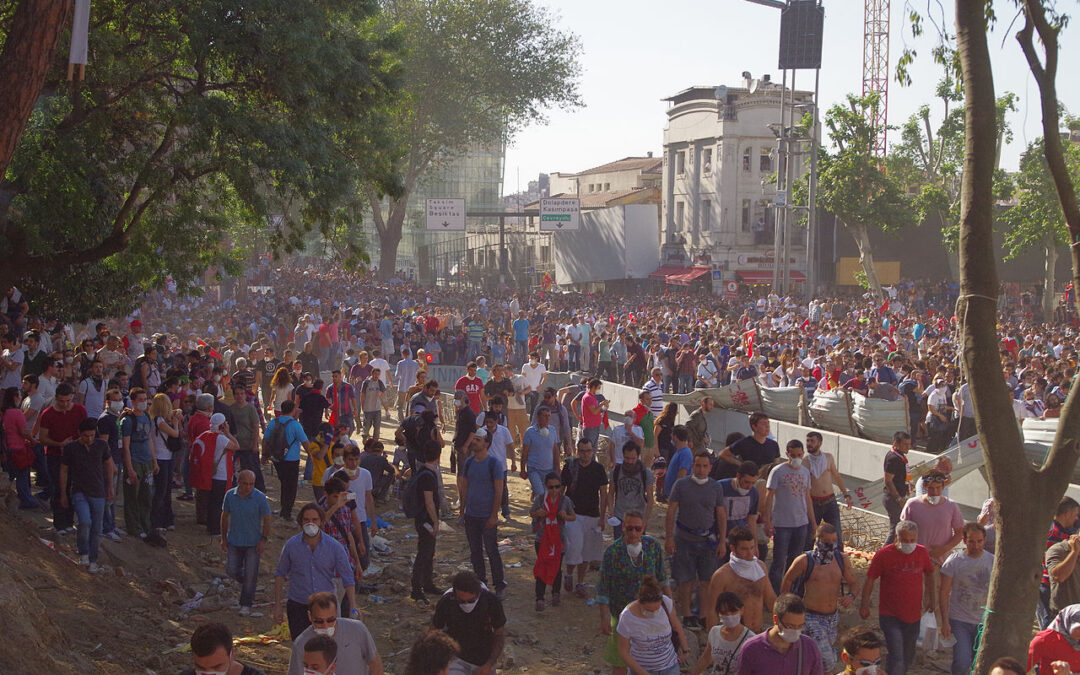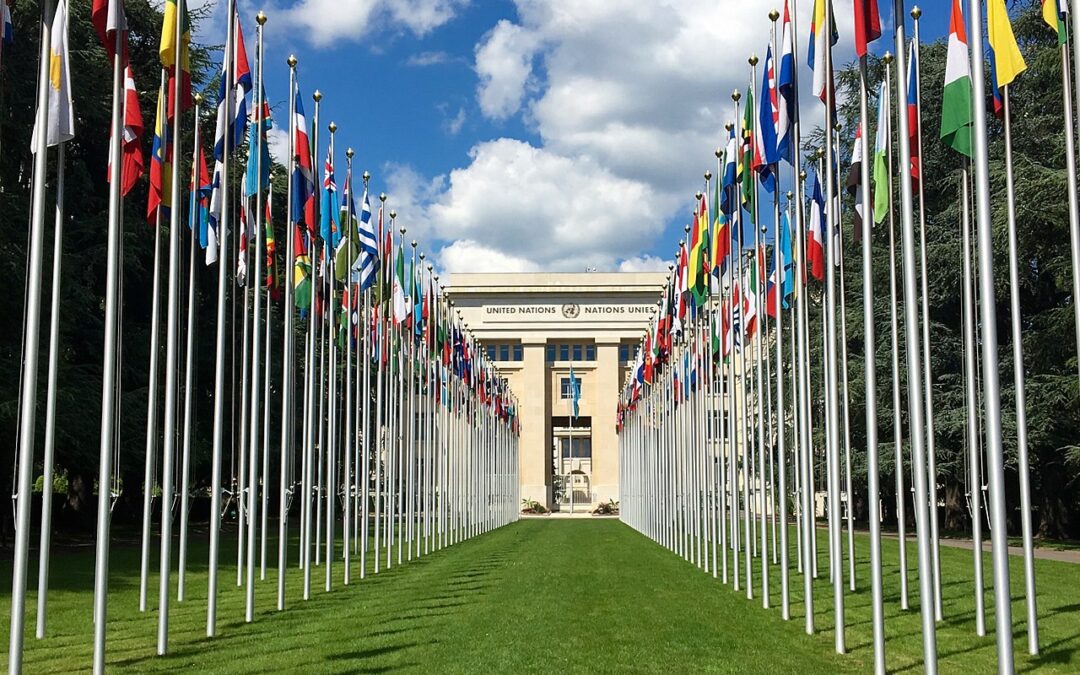
Sep 4, 2019 | News
The announcement that the remains of Pholachi “Billy” Rakchongcharoen, a Karen rights activist, have been located, brings a sad end to years of uncertainty for his family, said the ICJ and Amnesty International today.
This development should lead to a renewed focus on identifying the perpetrator(s) of his apparent enforced disappearance and bringing them to justice.
On 3 September 2019, the Thai Ministry of Justice’s Department of Special Investigations (DSI) announced it had located bone fragments, which they had identified as likely belonging to Billy inside an oil tank submerged in water near a suspension bridge inside Kaeng Krachan National Park in Phetchaburi province.
“The DSI should redouble its efforts to identify the perpetrator(s) of Billy’s killing and bring them to justice,” said Frederick Rawski, Asia Regional Director of the ICJ. “If, based on an assessment of the evidence, it is found that Billy was the victim of enforced disappearance, then the perpetrators, including those with command responsibility, should be charged with the appropriate, serious offences in accordance with Thailand’s obligations under international law – not only with lesser crimes that do not reflect the gravity of the offense.”
Billy was last seen on 17 April 2014 in the custody of Kaeng Krachan National Park officials.
“This case highlights the serious risks activists and human rights defenders face in Thailand, including assaults, enforced disappearance and killings,” said Nicholas Bequelin, Amnesty International’s interim Regional Director of Southeast Asia and the Pacific. “It underscores the long-overdue need for the Thai government to make enforced disappearance a crime under national law. A failure to do so results in the lack of an independent, impartial and effective mechanism to investigate the cases, exacerbating the current climate of impunity.”
The DSI stated that the recovered bones contain DNA inherited from Billy’s mother, which suggests they belong to a person who was related to her. However, the DSI declined to disclose the name of any suspect(s) and requested more time to investigate the case and examine the remains.
Background
Thailand is a state party to the International Covenant on Civil and Political Rights (ICCPR) and the Convention against Torture and other Cruel, Inhuman or Degrading Treatment or Punishment (CAT). Freedom from enforced disappearance is protected under both these treaties, as enforced disappearance will always constitute violations of some or more of the following rights: the right to life; freedom from torture and other cruel, inhuman, or degrading treatment or punishment; the right to liberty; and the right to recognition as a person under the law. These are in addition to violations of the rights of members of the disappeared person’s family through suffering deliberately inflicted on them through the imposition on them of uncertainty about their love one’s fate and whereabouts.
Thailand has also signed, but not yet ratified, the International Convention for the Protection of All Persons from Enforced Disappearance (ICPPED). The ICPPED affirms the absolute right not to be subject to enforced disappearance and places an obligation on states to investigate acts of enforced disappearance, to make it a criminal offence punishable by appropriate penalties that take into account its “extreme seriousness” and to take necessary measures to bring those responsible to justice.
The Government has stated it will not ratify the Convention until its provisions are incorporated in domestic law. However, efforts to pass the Draft Prevention and Suppression of Torture and Enforced Disappearance Act (draft Act) stalled after it was dropped by the National Legislative Assembly (NLA) prior to the 2019 national election. The draft Act is currently pending the consideration of the President of the National Assembly. Under international law of treaties, as signatory to the ICPPED, still is bound to desist from any acts which would defeat its object and purpose.
Thailand has a binding obligation under international law to conduct prompt, effective and thorough, independent and impartial, and transparent investigations into all suspected cases of unlawful death and enforced disappearance.
According to the ICPPED and the revised Minnesota Protocol (2016), which contains the international standards on the conduct of investigations into unlawful death and enforced disappearance – and which Thailand launched in May 2017 – records that investigations “must seek to identify not only direct perpetrators but also all others who were responsible for the death, including, for example, officials in the chain of command who were complicit in the death.” (para 26)
Download
Thailand-Discovery of Billy remains-news-webstory-2019-THA (full story in PDF)
Further reading
Thailand: special investigation into apparent enforced disappearance of “Billy” welcome, but much more is needed
Thailand: ICJ submits recommendations on draft law on torture and enforced disappearance amendments
Justice for Billy: Time for Thailand to Account for Activist’s Disappearance
Contact
For ICJ: Frederick Rawski, ICJ Asia-Pacific Director, t: +66 64 478 1121; e: frederick.rawski(a)icj.org

Sep 2, 2019 | News
On 30 August 2019, on the occasion of the International Day of the Disappeared, the ICJ co-hosted an art exhibition, a closed-door round table discussion and a public forum titled “Enforced Disappearance and the Absence of a Law” to commemorate individuals who were subject to apparent enforced disappearance and whose fates remains unknown.
The closed-door round table discussion provided an opportunity for victims’ voices to be heard on challenges faced in gaining access to justice and redress. Relatives spoke about the challenges they face, mostly about the poor progress of investigations into the allegations of enforced disappearance against their relatives.
Sanhawan Srisod, the ICJ’s Legal Adviser, during the closed-door round table discussion, gave a briefing about the latest developments on the Draft Prevention and Suppression of Torture and Enforced Disappearance Act. The legislation had been dropped by the National Legislative Assembly (NLA) prior to the 2019 national elections, but is currently before the President of the National Assembly, pending his consideration to bring it before the House of Representative.
The public forum focused on the development and progress of the investigations into enforced disappearances and evaluated the progress in developing legislation in Thailand to address this critical issue.
During the public forum, Sanhawan Srisod highlighted that the Draft Act would, if adopted, fail to bring the law into full compliance with Thailand’s international human rights obligations. The key concerns include:
- Incomplete definitions of the crimes of enforced disappearance;
- The continuous nature of the crime of enforced disappearance that was not recognized in the Draft Act;
- Inadequacy of provisions on the command responsibility;
- Possibility that the military court may have power to try and adjudicate enforced disappearance cases; and
- Insufficient safeguards against enforced disappearances.
Background
Thailand has signed but has yet to ratify the International Convention for the Protection of All Persons from Enforced Disappearance.
According to their 2018 annual report, the UN Working Group on Enforced or Involuntary Disappearances has recorded 86 outstanding cases of alleged enforced disappearance in Thailand.
The Thai government, through the recently set up Committee Managing Complaints for Torture and Enforced Disappearance Cases, says it is currently conducting investigations in connection with this list.
Closed-door round table discussion session included the following speakers: Ms. Phinnapha Phrueksaphan, wife of Mr. Porlajee Billy Rakchongcharoen; Ms. Angkhana Neelapaijit, wife of Mr. Somchai Neelapaijit; Ms. Pranee Danwattananusorn, wife of Mr. Surachai Danwattananusorn; Mr. Adisorn Pho-Arn, son of Mr. Thanong Pho-Arn; Ms. Kanya Theerawut, mother of Mr. Siam Theerawut; Ms. Suphab Kamlae, wife of Mr. Den Kamlae; Mr. Prasert Laosophapan, brother of Mr. Kamon Laosophapan; Ms. Shui-Meng Ng, wife of Mr. Sombath Somphone from Lao PDR; Mr. Truong Son Nguyen, Regional Campaigner, Amnesty International Vietnam; Representatives, indigenous Lahu Community, Chiang Mai province; and Ms. Sanhawan Srisod, Legal Adviser, International Commission of Jurists
Public forum session included the following speakers: Ms. Shui-Meng Ng, representative of Asian Federation Against Involuntary Disappearances; Ms. Angkhana Neelapaijit, wife of Mr. Somchai Neelapaijit; Ms. Phinnapha Phrueksaphan, wife of Mr. Porlajee Billy Rakchongcharoen; Mr. Angsukate Wisutwattanasak, Director of Security Cases Department 1, Department of Special Investigation (DSI); Ms. Nongporn Roongpetchwong, Human Rights Expert, Rights and Liberties Protection Department, Ministry of Justice; and Ms. Sanhawan Srisod, Legal Adviser, International Commission of Jurists. The opening session included remarks from Mr. Giuseppe Busini, Deputy Head of Mission of the Delegation of the European Union to Thailand, and Mr. Surapong Kongchantuk, President of the Cross-Cultural Foundation. The closing session included remarks from Mr. Badar Farrukh, Human Rights Officer, OHCHR Regional Representative for South East Asia.
See Also:
Summary of the ICJ analysis of the Draft Act (PDF)
Thailand: ICJ submits recommendations on draft law on torture and enforced disappearance amendments

Aug 21, 2019 | News
The ICJ in collaboration with the Zimbabwe Anti-Corruption Commission (ZACC) and the National Prosecuting Authority (NPA), today launched a broad base anti-corruption awareness campaign in Harare.
The campaign was introduced by the President of Zimbabwe H.E. Cde Emmerson D. Mnangagwa and is expect to effectively run for 15 months.
It will harness different forms of media to spread awareness on the negative impact corruption has on the rule of law, human rights and development.
The anti-corruption awareness campaign is part of a broader longstanding rule of law initiative by the ICJ in collaboration with with stakeholders in the justice sector, to strengthen the rule of law for the protection and promotion of human rights for all, including women and persons from marginalized or disadvantaged groups.
Corruption undermines the rule of law by impeding access to justice through diversions of public resources for private gain.
As such the ICJ, through the support of the EU, is working towards increased transparency and integrity in the justice delivery system in order to increase access to justice for all.
“Zimbabwe has no option but to fight corruption if it is to be a just, peaceful and successful developmental state,” said Arnold Tsunga, ICJ’s Africa Regional Director.
“The reconstituted ZACC has demonstrated a strong desire to pursue its mandate with renewed commitment from other stakeholders in the justice delivery chain,” he added.
The campaign is not undertaken in isolation. It builds on other initiatives to combat corruption under this programme, which include the establishment of an anti-corruption court, training of personnel for the court and various research initiatives.
The campaign seeks to support the national efforts against corruption, and sensitize the public on the negative effects of corruption in society.
It will promote awareness on how to report corrupt practices, how to avoid corrupt practices and the impact of corruption on the public interest.
The campaign acknowledges that different sections of the population engage with media in varying manners. As such it utilises a wide array of approaches designed to build the optimism of the people of Zimbabwe to take an active role in efforts to combat corruption at every level of society.
The campaign launch was attended by justice sector actors, civil society representatives, business representatives and the diplomatic.
Contact:
Arnold Tsunga, Director of the Africa Regional Programme, International Commission of Jurists C: +263 77 728 3248, E: arnold.tsunga(a)icj.org

Jul 18, 2019 | News
The ICJ and the International Bar Association’s Human Rights Institute (IBAHRI) have jointly sent international observers to attend the second hearing of the criminal trial on the “Gezi Park” protest at the Silivri Prison Courthouse in Istanbul, scheduled to take place on 18 and 19 July 2019.
The ICJ and IBAHRI observers will be monitoring a trial hearing before İstanbul 30th Assize Court with prinicipal defendant Osman Kavala, and 15 others; Ali Hakan Altınay, Ayşe Mücella Yapıcı, Ayşe Pınar Alabora, Can Dündar, Çiğdem Mater Utku, Gökçe Yılmaz, Handan Meltem Arıkan, Hanzade Hikmet Germiyanoğlu, İnanç Ekmekci, Memet Ali Alabora, Mine Özerden, Şerafettin Can Atalay, Tayfun Kahraman, Yiğit Aksakoğlu and Yiğit Ali Ekmekçi.
The observers will report directly to the IBAHRI and ICJ Secretariats on the proceedings following the mission.
The Gezi Park protests began in May 2013 as an effort by a group of environmentalists to save a park in central Istanbul from being rezoned, but soon turned into nationwide demonstrations.
The protest was quelled by police with the use of tear gas and water cannons against the protesters in Taksim Square. Following a six-year investigation into the events, the 657-page indictment issued by the Istanbul Chief Public Prosecutor’s Office was accepted by the 30th A Court in Istanbul on 4 March 2019.
The defendants are to be charged under Turkish Criminal Code Article 312 (attempt to overthrow the Turkish Government or attempt to prevent it from fulfilling its duties), Article 151 (damage to property), Article 152 (qualified damage to property), Article 174 (possession or exchange of hazardous substances without permission), Article 153 (damaging places of worship and cemeteries), Article 149 (qualified robbery), Article 86 (intentional injury); crimes under the Law on Firearms, Knives and Other Tools no. 6136, and crimes under the Law on Protection of Cultural and Natural Assets no. 2863.
The total sentence asked for by the prosecution for these offences amounts to approximately 47,520 years imprisonment.
Contact:
Massimo Frigo, Senior Legal Adviser, t: +41 22 979 38 05 – e: massimo.frigo(a)icj.org

Jul 17, 2019 | Advocacy, News, Non-legal submissions
Today, the ICJ filed a submission to the Human Rights Council’s Working Group on the Universal Periodic Review in advance of its review of Turkey’s human rights record in January 2020.
In its submission, the ICJ considered:
- the situation with the independence of the judiciary in Turkey, during and after the state of emergency of 2016-2018;
- the lack of effective remedies for the mass dismissals in the public sector occurred in that period;
- the shortcomings in fair trial rights in the criminal justice system:
- the obstacles to the action of civil society;
- the lack of accountability for torture and enforced disappeareances; and
- provided information on the status of international human rights treaties ratified by Turkey.
Contact:
Massimo Frigo, ICJ Senior Legal Adviser, e: massimo.frigo(a)icj.org
Full submission in English (PDF) : Turkey-UPR-Advocacy-non-legal submissions-2019-ENG









